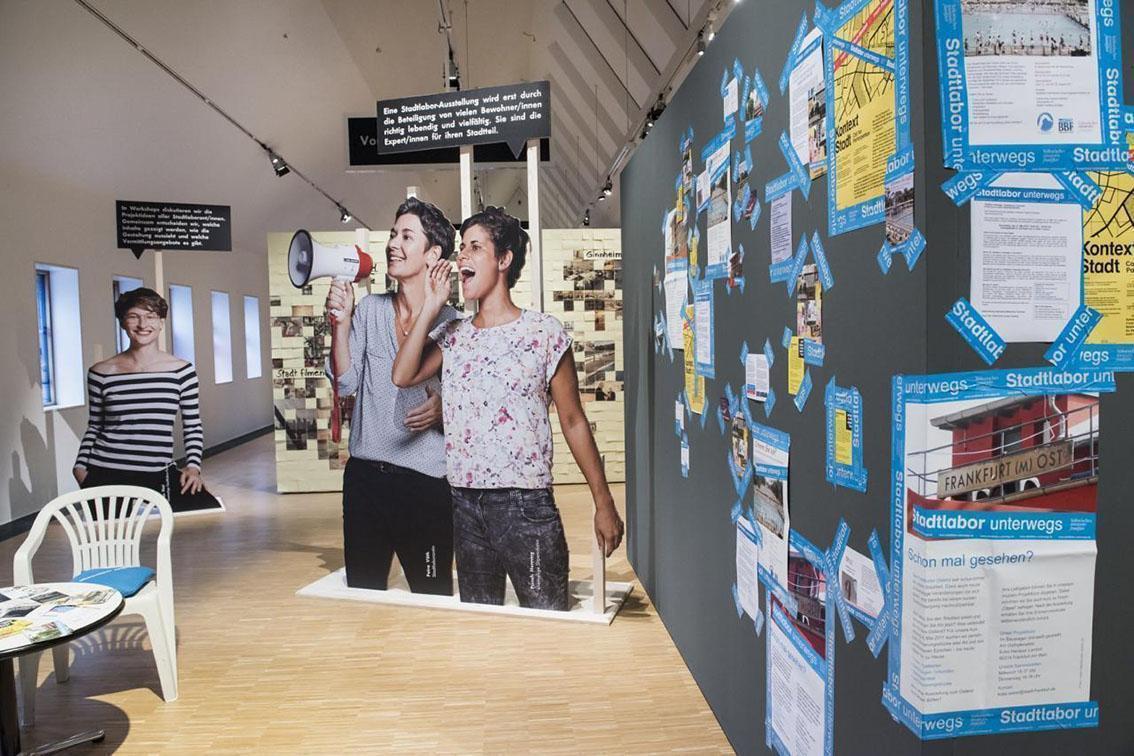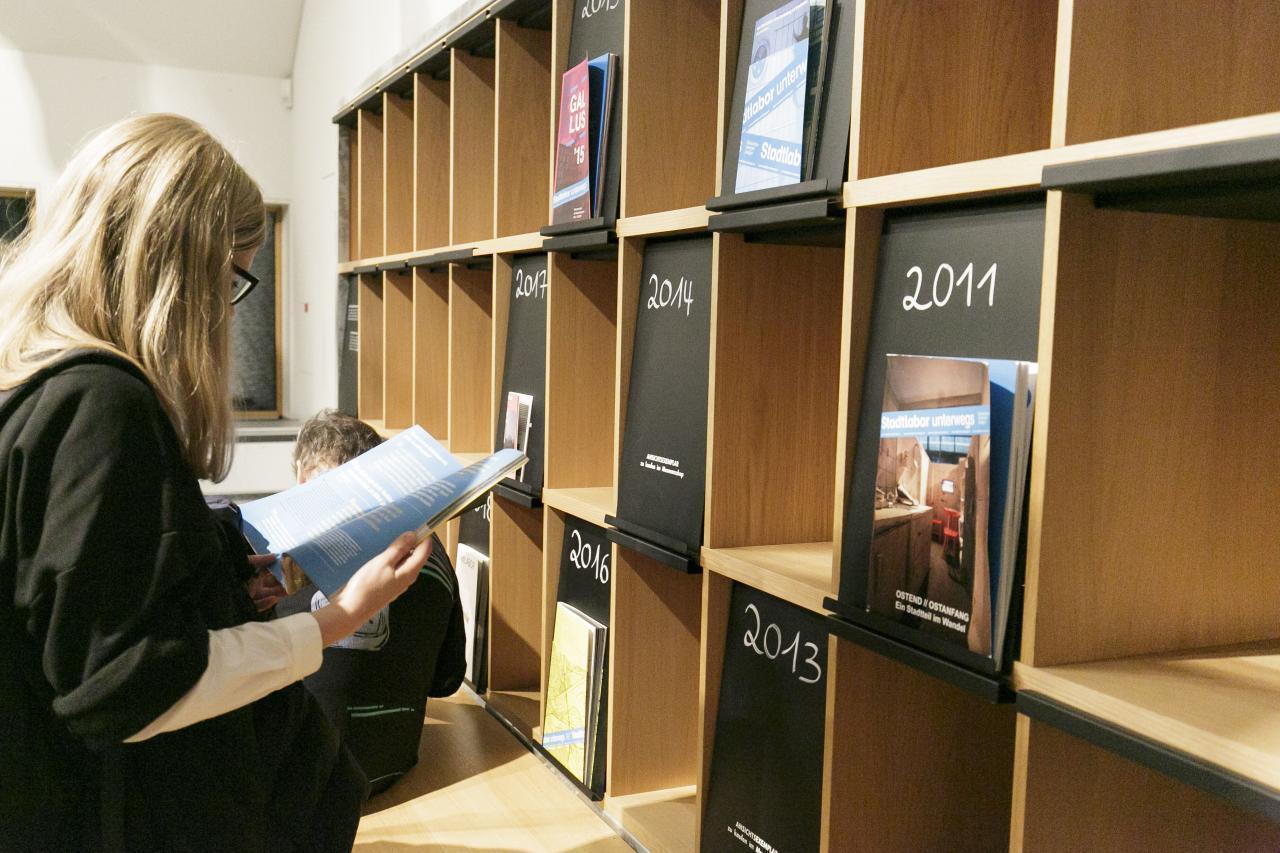CityLab Revisting Collections.
Collecting migration by participation
Interviews of the CityLab participants
In these interviews, 13 people describe objects that reflect migration history for them. The selection and justification of these "migration objects" makes clear what is actually self-evident, but is still neglected in the public discussion: migration is not a uniform phenomenon and "migrants" are not a homogeneous group. The decision to migrate is as different as the arrival in Germany. The integration of the miration experience into one's own biography and the memory of the family migration history are also shaped individually. On the basis of 13 selected objects, the project participants describe the field of tension of migration history between individual life design and social structures.
Interview with Muniat Akhouaji
In her interview she talks about a headscarf that her mother brought back from Morocco in the early 1980s. She explains what the headscarf means for her mother and for herself, and finds similarities, but also differences.
In the interview she describes difficult and traumatic experiences she had as a headscarf wearer, especially after September 11th, and explains why her decision to wear a headscarf made her stronger. Finally, she describes why "integration has nothing to do with religion" and what it means to her to see her mother's headscarf in a museum.
Muniat Akhouaji was born in Darmstadt in 1978.
Her father came to Germany in 1973 at the age of seventeen as a guest worker from Morocco, where his father already lived. Her mother came in 1977. Akhouaji is the third of ten children. She studied computer science in Darmstadt and trained as a state-approved childcare worker in Frankfurt. She currently works as a pedagogue at Kita Frankfurt. She is married and has three children.
Muniat Akhouaji was born in Darmstadt in 1978.
Her father came to Germany in 1973 at the age of seventeen as a guest worker from Morocco, where his father already lived. Her mother came in 1977. Akhouaji is the third of ten children. She studied computer science in Darmstadt and trained as a state-approved childcare worker in Frankfurt. She currently works as a pedagogue at Kita Frankfurt. She is married and has three children.
Interview with Nikolaus Athanassiadis
In the interview he talks about a brochure that the Greek community published for their 50th anniversary. The Greek Community is the oldest organisation of Greeks in Frankfurt. It was founded in 1956 by fur traders and furriers who had come to Frankfurt from Leipzig and by self-employed people. In an interview he also explains his understanding of "successful integration" and discusses the term "German with a migration background".
Nikolaus Athanassiadis was born in 1941 as the son of a pharmacist and a doctor on the island of Euboa in Greece. In 1963 he came to Frankfurt to study law. After his second state examination in 1973, he became a research assistant for criminal law at the Goethe University. In 1976 he founded his own office in Bockenheim, which he still runs today. He was the first Greek lawyer in Frankfurt. Nikolaus Athanassiadis has both Greek and German citizenship. Since 2006 he has been chairman of the Greek Community of Frankfurt/.-Hessen e. V.
Interview with Athanasios Basdekis
In the interview he speaks about a photo from 1962 showing him as a student of Orthodox theology with the Ecumenical Patriarch Athenagoras, his certificate of naturalization from 1977 and about a photo and a certificate for the awarding of the Golden Cross 1st Class on 15.5.2016. Baskedis received the award in honor of his work as a consultant of the "Ökumenische Centrale". In the interview he expresses his feelings for Frankfurt and explains what it means to him to be both Greek and German.
Athanasios Basdekis was born in 1943 in a small village in northern Greece. From 1961 to 1965 he studied Orthodox Theology at the renowned Theological University of Chalki near Istanbul, which was closed by the Turkish military government in 1971. With a scholarship from the Catholic Church, Baskedis received his doctorate in Münster. In 1975 he came to Frankfurt, where he worked as a consultant for the "Ökumenische Centrale" (ACK) until his retirement in 2006. His tasks included teaching Orthodox theology and church, as well as cultivating the relations of the Greek Orthodox Church with other churches.
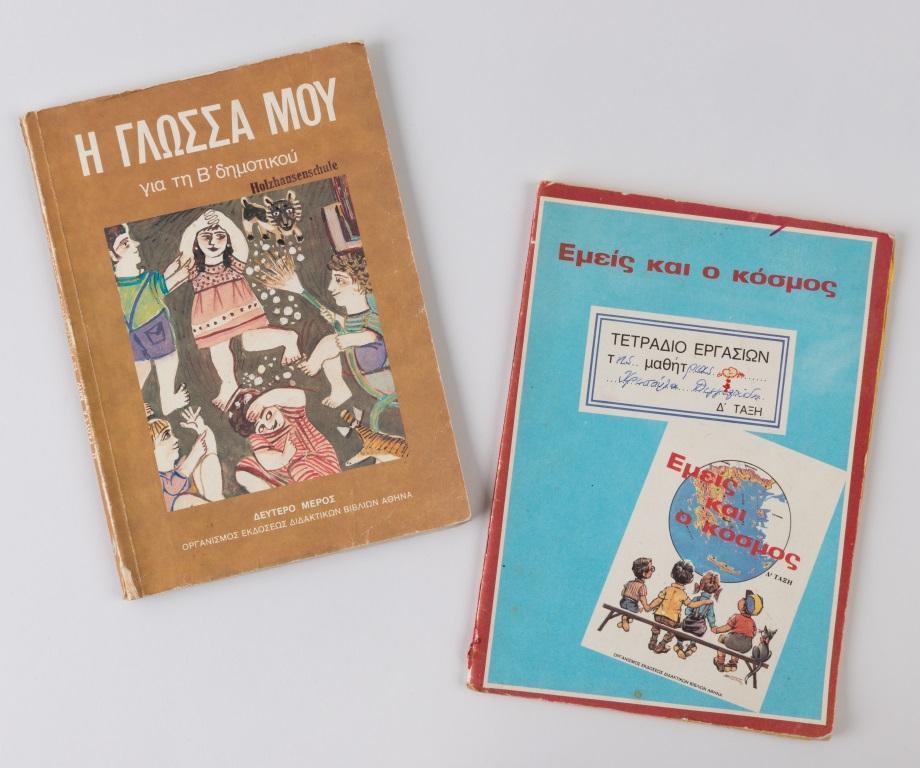
Interview with Chrisula Dingiludi
In her interview she gives an interesting insight in two textbooks that she had used for her Greek lessons at the Holzhausen School. In the interview, she remembers her childhood, explains her relationship to the Greek and German languages then and today, and explains why she rejects the word "migrant".
Chrisula Dingiludi was born in Northern Greece in 1979. At preschool age she came to Germany with her parents and her older sister, where her family first opened a restaurant. When she was four years old her family moved to Frankfurt. Chrisula Dingiludi attended the Holzhausen School, where she was taught in Greek and German in a purely Greek class. After graduating from high school, she studied literature, media studies, and middle and modern history in Marburg. Chrisula Dingiludi advises companies on digital concepts and moderates content workshops at DB Systel. She has been active in various associations on a voluntary basis for several years: as a founding member of the Digital Media Women network, as an event member of Barcamp RheinMain and as an trainer at Kinder- und Jugendtelefon Frankfurt.
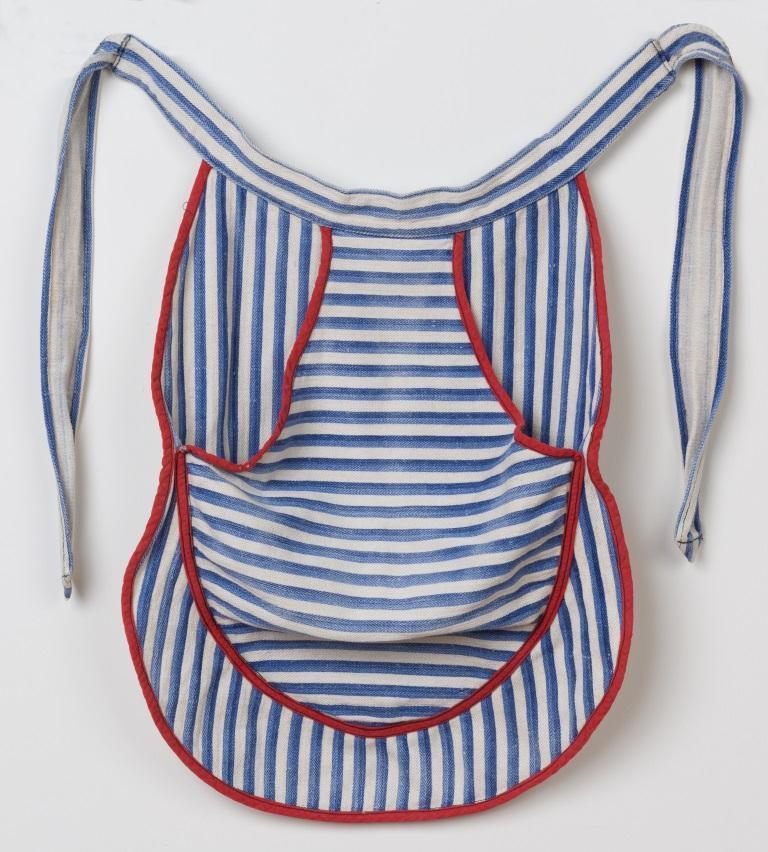
Interview with Dr. Andreas Eichstaedt
In the interview he talks about an apron for storing clothespins. Eichstaedt's grandfather was released from Russian captivity in 1946 to his hometown Brünn (Czechoslovak Republic). On the basis of Article XIII, the so called "Potsdam Declaration" of 2.8.1945, the "deportation" was to be carried out in a "proper and humane manner". This meant that, according to the Czech interpretation, each person was allowed to take 30 kg of luggage, but according to the American interpretation, each person was allowed to take at least 50 kg. If the "deportees" lacked clothing, the Czech side committed itself to "provide the missing parts". Because his grandfather had nothing left, a suitcase was packed for him, among other things with a prisoner suit, in order to achieve the required weight. With this suitcase he arrived in Frankfurt. From the prisoner suit a small apron was cut here, which is still used today to hang up the clothespins for storing the laundry.
In the interview, he explains what the apron means to him, raises the problem of the term "Frankfurters with a migration background" with regard to the "displaced persons" and explains why this group should find a place in the permanent exhibition at HMF.
Andreas Eichstaedt was born in Frankfurt in 1952. After his high school graduation he studied law and completed both state exams. In 1981 he received his doctorate with a legal history topic. From 1980 to 1983 he was an official lawyer for the Frankfurt Regional Association, then a consultant first with the former City Treasurer and then with the Lord Mayor of Frankfurt. From 1986 to 2016 he worked for a number of Frankfurt municipal companies, mostly as managing director, including 24 years with SAALBAU GmbH itself.
Andreas Eichstaedt was born in Frankfurt in 1952. After his high school graduation he studied law and completed both state exams. In 1981 he received his doctorate with a legal history topic. From 1980 to 1983 he was an official lawyer for the Frankfurt Regional Association, then a consultant first with the former City Treasurer and then with the Lord Mayor of Frankfurt. From 1986 to 2016 he worked for a number of Frankfurt municipal companies, mostly as managing director, including 24 years with SAALBAU GmbH itself.
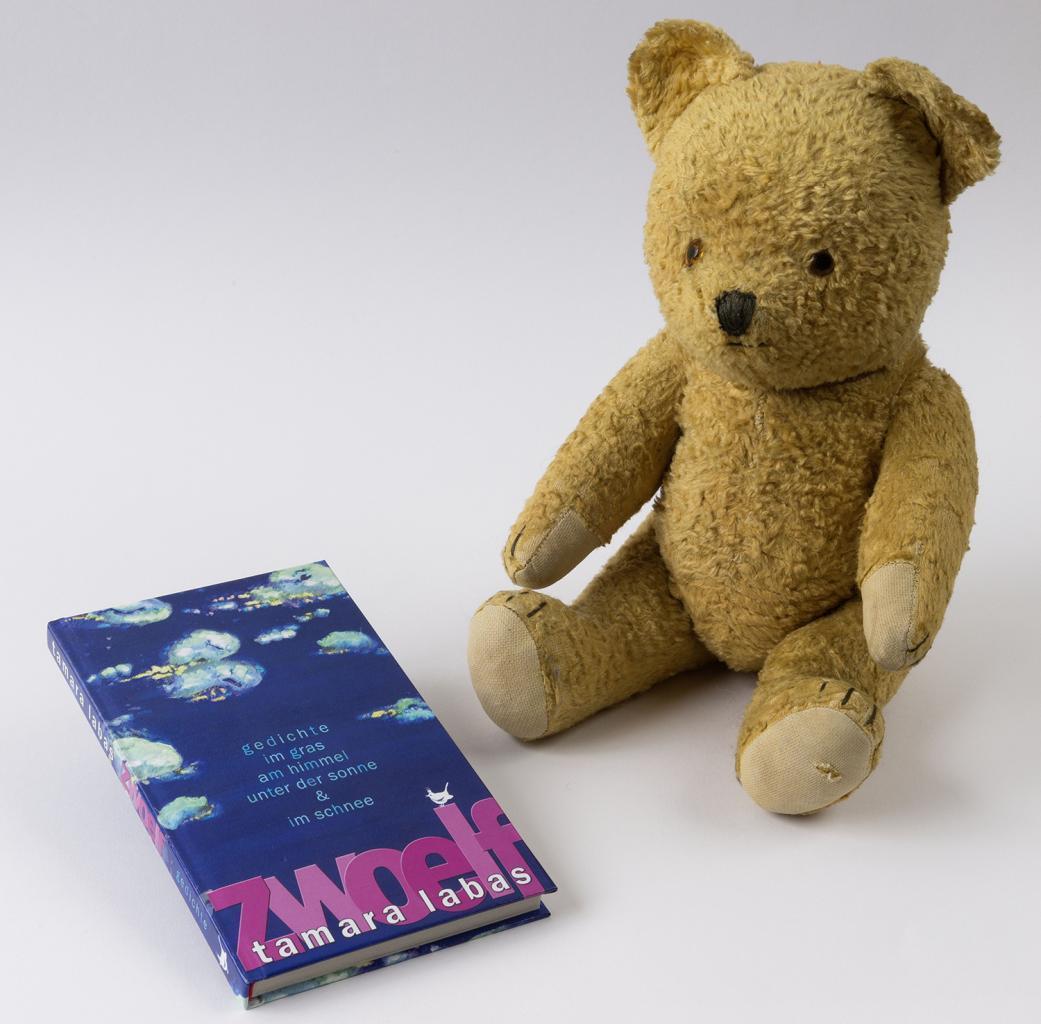
Interview with Tamara Labas
In her interview, she describes her personal memories and feelings as a guest worker child in Frankfurt, explains why her story is not unique but typical for many children who emigrated to Germany as guest workers, and argues why the history of guest worker children should be remembered.
She talks about a teddy bear she brought back from Croatia as a toddler and a poem entitled "Wurzelkoffer mit Teddybär" (Root case with teddy bear), which was published in the poetry collection "Zwölf" 2017 by Größenwahn Verlag. Tamara Labas was born in Zagreb (Croatia). As a toddler she came to Frankfurt with her parents. She spent her high school years in Frankfurt and parts of it in Zagreb. She studied German language and art history at the Goethe University and trained as a psychoanalytical therapist for couples, families and social therapy at the Institute for Psychoanalysis and Psychotherapy in Giessen. She has been working as an author for several years and since March 2014 she has been the chairperson of the literary club Frauen aus aller Welt e.V.
Interview with Friedemann Neumann
In his interview, he speaks about how migration and transculturation, if you examine them historically or ethnographically, become visible in things, places and objects where you wouldn't expect it: in his grandmother's apartment, a carpet from Iran represents how "global influences secretly smuggle themselves into living rooms without people noticing".
In the apartment of a woman of Turkish origin who he interviewed during his research project, he noticed that she had no carpet in her kitchen. During the conversation he learned that mother and daughter had an argument about it. In his eyes, this argument is more than a struggle between generations, but has a transcultural dimension. In his interview, he describes why "migration" should be considered beyond stereotypes and foreign attributions and describes what he learned in the project Collection Check.
Friedemann Neumann was born in Reutlingen (Baden-Württemberg) and came to Frankfurt about ten years ago to study ethnology. Before this, he trained as a landscape gardener. He is currently working at the Institute for Ethnology as a research assistant on migration. The subject of his research is material culture and migrant households.
Friedemann Neumann was born in Reutlingen (Baden-Württemberg) and came to Frankfurt about ten years ago to study ethnology. Before this, he trained as a landscape gardener. He is currently working at the Institute for Ethnology as a research assistant on migration. The subject of his research is material culture and migrant households.
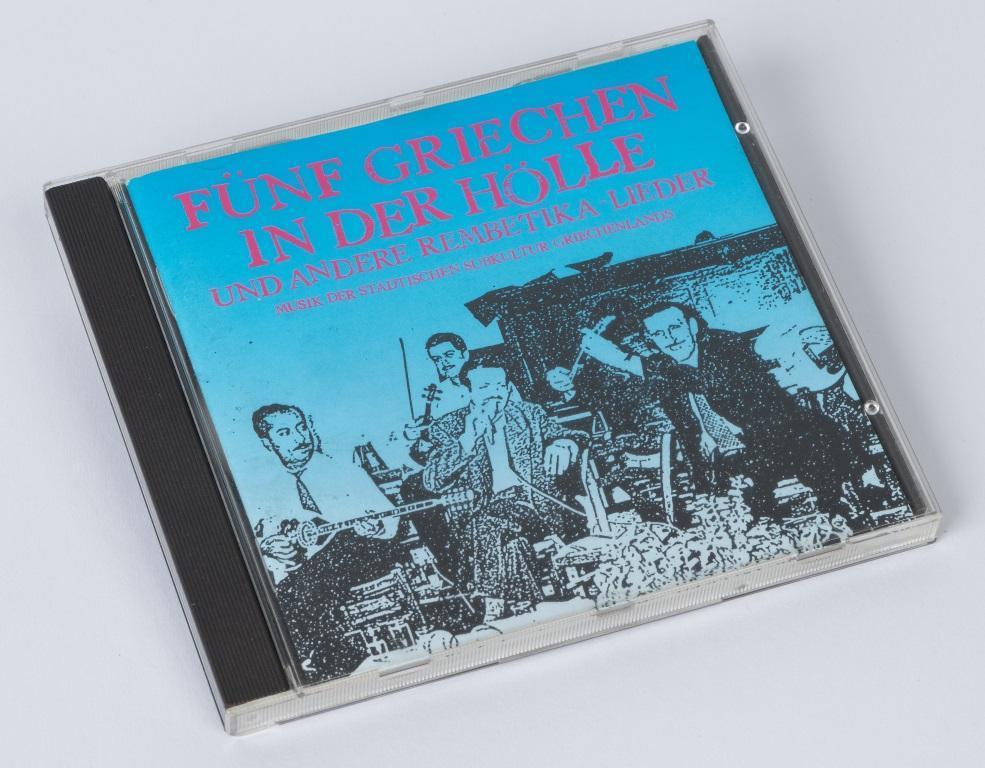
Interview with Peter Oehler
In his interview Peter Oehler comments about a CD with the title "Five Greeks in Hell", a collection of 22 Rembetiko songs. The album was first released on vinyl by TRIKONT Verlag in Munich in 1982.He talks about the creation of this collection in Greece and Frankfurt in the late 1970s, a story he researched in the context of Revisiting Collections Migration. He explains why this record " has experienced a spatial movement" and talks about his personal relationship to Rembetiko music.
Peter Oehler was born in 1962 in Mülheim an der Ruhr. He studied electrical engineering and received his doctorate in computer science. He writes prose and essays for literary journals and anthologies. Since 1994 he has been travelling regularly to Greece. He is currently a city district historian for the "Stiftung Polytechnische Gesellschaft" with the topic "Greeks in Frankfurt". For his project he has interviewed more than 20 Greeks in Frankfurt up to now.
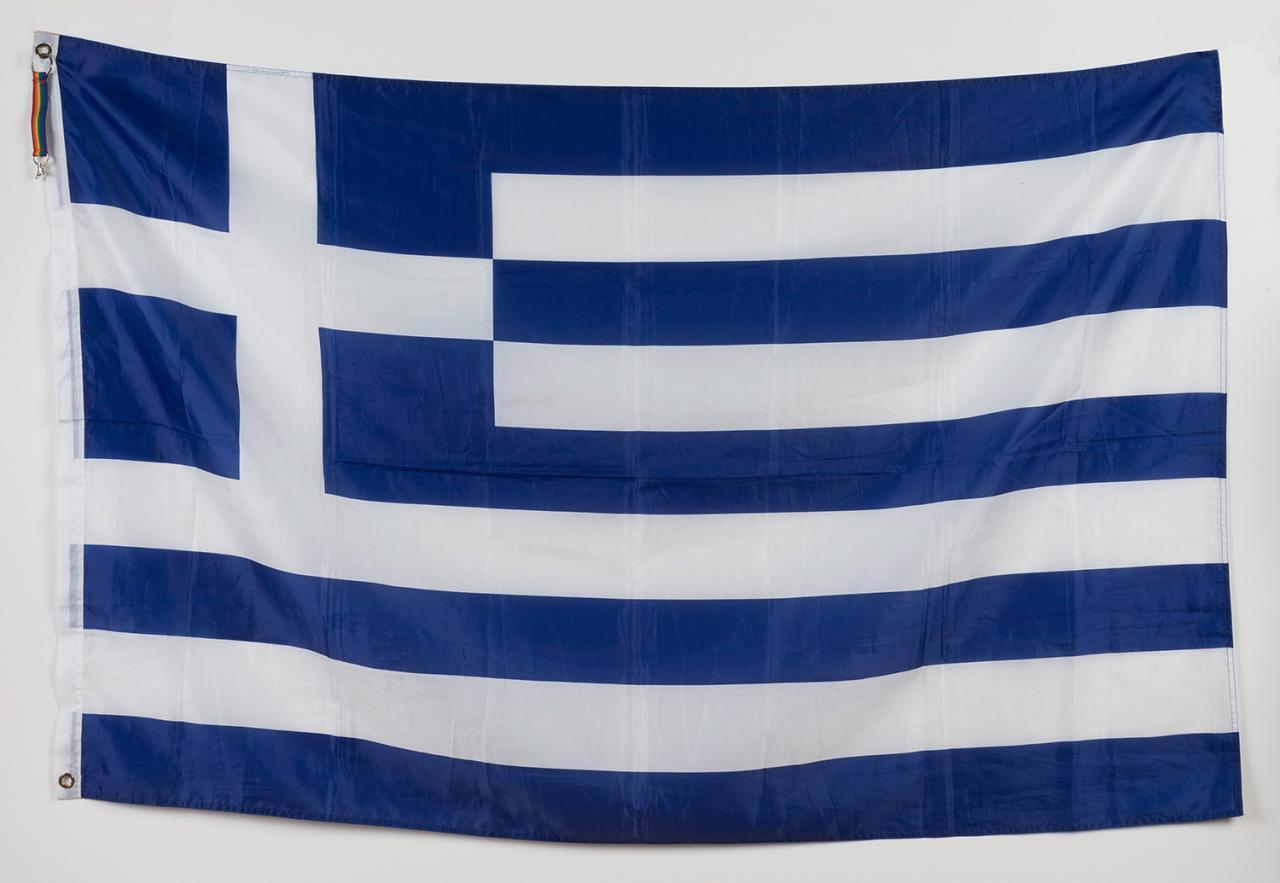
Interview with Sevastos Sampsounis
In his first interview, he comments on two books published by Größenwahn-Verlag. The book with the title "Bewegt" is the first book published by him. "Xenos in Greece" is about the experiences of German immigrants in Greece. In his article he talks about identity, the "new German language" that is currently emerging, and about "how similar people think when they are defined somewhere as foreigners".In his second interview, he comments on a Greek flag with a rainbow pendant, which he presented in the CityLab group. The flag was presented by the "Ermis Group", the Frankfurt Greek gay and lesbian community, at the CSD in Frankfurt in 2001. He talks about the importance of this flag as a symbol of identification and describes what it means to his group to be allowed to present it at HMF. Finally, he explains why it would not have been possible to establish the "Ermis Group" in another city.
Sevastos Sampsounis was born in Darmstadt as a child of a Greek family of guest workers from Thrace. When he was three months old he was sent to his grandparents in Greece. Like many "suitcase children" he spent his childhood and youth travelling between Greece and Germany. Sevastos Sampsounis has lived in Frankfurt since 2001, he writes and illustrates children's books. He is a partner of Café Größenwahn and owner of the Größenwahn-Verlag Frankfurt am Main. The company focuses on the promotion of authors with a migration background. Since 2000, he has been involved in the "Ermis-Frankfurt" group, an association which campaigns for the rights of Greek gays and lesbians in Frankfurt.
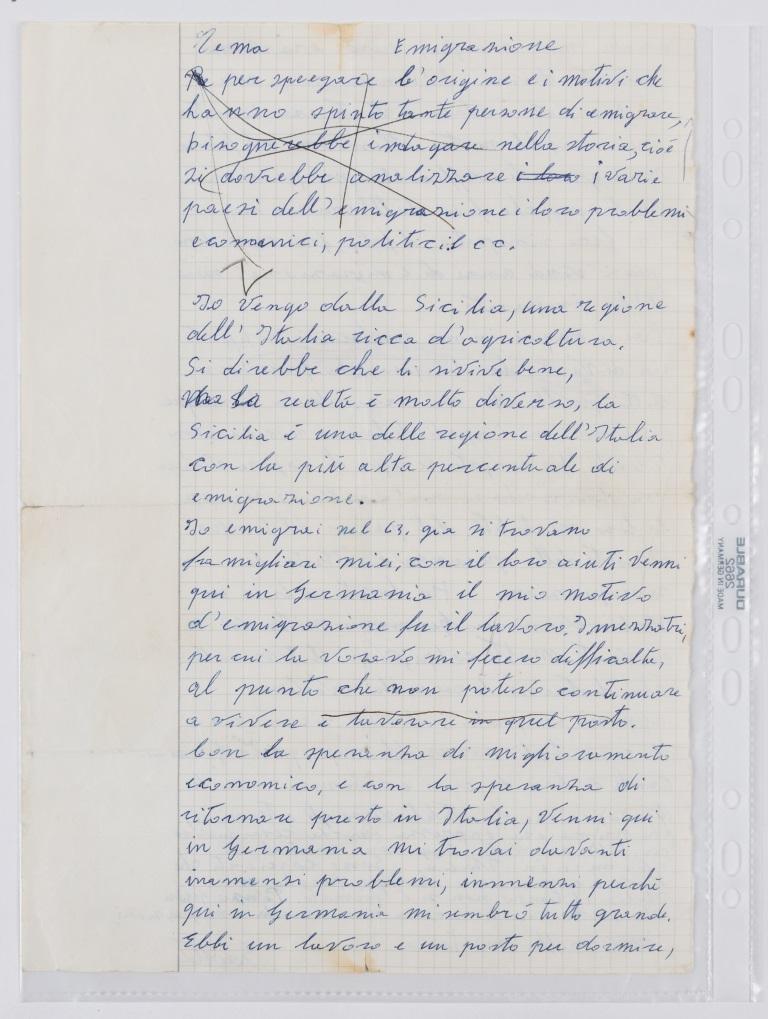
Interview with Calogera von Auw
In her interview she talks about an essay on the subject of "migration" that her father had written in 1981/82 as part of a course. The course was an offer of the Catholic community and was intended for the subsequent acquisition of a school leaving certificate for emigrants. The essay is an occasion for von Auw to talk about her father's life and his relationship to Germany. She explains why learning German is not the same as "integration" and finally, why the history of the "Gastarbeiter" is important and still relevant.
Calogera von Auw, born Saitta, is the daughter of Melchiorre and Provvidenza Saitta, two "guest workers" from Sicily who came to Frankfurt in the early 1960s. Until she was ten years old, she lived with her grandparents in Sicily, then her parents brought her to Frankfurt. Melchiorre and Provvidenza Saitta had returned to Sicily in 1967, where they had used their savings to build a house. After the newly built house was completely destroyed in an earthquake in 1968, they returned to Frankfurt and started from scratch. In 1970 they brought their daughter to live with them. While the parents finally returned to Sicily in 1982, Calogera von Auw stayed in Frankfurt. Today she is head of the "Caritasverband Frankfurt e.V. Fachdienste für Migration Team Höchst".
Interview with Giuseppe Zambon
In his contribution, he takes a critical look at the "domestic struggle" and the "revolutionary student movement", looks back on this period and describes this chapter of Frankfurt history from his perspective.
In his interview he talks about four books and a brochure of the "Unione Inquilini", which he published between 1973 and 1980, and a record of the "Unione Inquilini". The book "infazia deportata oggi" describes the impressions of guest worker children in Germany. Zambon speaks about the genesis of this book and the German translation with the title "Kinder aus dem Süden", which was published by his Frankfurt publishing house. The book "Gardenie e proletari" describes the experiences of an Italian, who Zambon knew personally, in a Frankfurt commune in 1968. The brochure of the "Unione Inquilini" is an opportunity for Zambon to talk about the struggle of the "Unione Inquilini" and about their ideological differences to the "revolutionary groups" of the 1970s. He will also speak about the book "Francoforte e il nostro futuro", the first book he published in Milan in 1978, in which he focused on the lack of housing for guest workers in Frankfurt in the 1970s. Finally, he talks about a record of the "Unione Inquilini", which he produced after the occupation of the house of the Frankfurt couple Pollak.
Giuseppe Zambon was born in Venice in 1931. In 1972 he came to Frankfurt from Milan as an activist of the "Unione Inquilini" (tenants' association). In Milan he was already active in the squatter movement. In Frankfurt he continued his activities with the "Unione Inquilini" group. Since 1974 he has been working in Frankfurt as a bookseller and publisher with a focus on left-wing anti-capitalist literature. In 1987 he opened the "Südseite internationale Buchhandlung", which still exists until today.
Giuseppe Zambon was born in Venice in 1931. In 1972 he came to Frankfurt from Milan as an activist of the "Unione Inquilini" (tenants' association). In Milan he was already active in the squatter movement. In Frankfurt he continued his activities with the "Unione Inquilini" group. Since 1974 he has been working in Frankfurt as a bookseller and publisher with a focus on left-wing anti-capitalist literature. In 1987 he opened the "Südseite internationale Buchhandlung", which still exists until today.
Interview with Athenagoras Ziliaskopoulos
In his interview he talks about an Icon of Mary that he brought back from the Holy Mount Athos. The Icon is a copy of a wall painting from the Dochiariou Monastery where he lived for five years. He tells about the history of the Icon, his deep personal relationship with it and reports about the importance of Marian portraits for Greek immigrants from yesterday and today.
Dr. Athenagoras Ziliaskopoulos was born in Reutlingen (Baden-Württemberg) in 1970 as a son of Greek guest workers. He studied German language and theology in Thessaloniki and spent several years on Mount Athos, an orthodox monk's republic in Greece. In 1998 he was ordained priest in Frankfurt. From 1999 to 2004 he was a pastor in the St. Salvator Church in Munich. In 2004 he returned to Frankfurt and became pastor of the Prophet Elias Church in Bockenheim. Right before this interview he became head of the orthodox seminary in Toronto. Athenagoras Ziliaskopoulos now lives in Canada.

